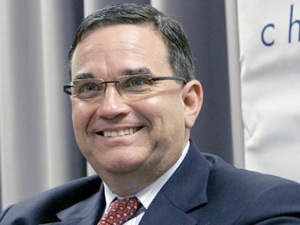-
- Same-sex marriage – New Jersey legislator urges compliance with civil unions law
- U.S. gay rights groups heartened by political gains in the states
- Same-sex marriage bill is new reason to celebrate Pride in New York
- Exhibit examines history of gay veterans
- Identity thieves torture boy, murder lesbian mother
- Christian, Jewish, Buddhist groups at head of NYC Pride parade
- National News Briefs
- World News Briefs
national
U.S. gay rights groups heartened by political gains in the states
20 states have enacted laws outlawing anti-gay discrimination
Published Thursday, 28-Jun-2007 in issue 1018
NEW YORK (AP) – The U.S. same-sex marriage debate has created an oddly divided America, with only the country’s Northeast corner and Pacific Coast recognizing same-sex unions. But gay rights leaders are encouraged by progress on other parts of their agenda across the American heartland.
Three states – Oregon, Iowa and Colorado – have enacted laws this year outlawing anti-gay discrimination, raising the total to 20 states that account for more than half the U.S. population. Twelve of those states extend those protections to transgender people.
Elsewhere, politicians who became the first openly gay members of their state legislatures have had an impact, helping pass gay rights bills or thwarting measures they viewed as anti-gay. In Arkansas, in the conservative southern U.S., for example, state Rep. Kathy Webb’s heartfelt arguments played a role in the rejection of a bill to bar gays from adopting or becoming foster parents.
“It makes a difference when it’s personal,” Webb said in a telephone interview. “It’s harder to ignore the evidence when it’s a friend and colleague who’s talking.”
In Dallas, openly gay city councilmember Ed Oakley emerged from an 11-candidate field to reach Saturday’s runoff election for mayor. Though he lost, activists were pleased by his 42 percent support in what traditionally has been considered a conservative city.
Other trends have buoyed gay rights leaders, including:
–Bright prospects for congressional passage of two gay rights bills: a hate-crimes bill that would cover offenses motivated by anti-gay bias, and a measure that would outlaw workplace discrimination based on sexual orientation.
–Intensifying demands for repeal of the “Don’t Ask, Don’t Tell” policy that bars openly gay people from serving in the military. The Bush administration supports the policy; all the Democratic presidential candidates oppose it.
–The broad repudiation of anti-gay remarks by several national figures, notably TV actor Isaiah Washington, commentator Ann Coulter and the outgoing chair of the Joint Chiefs of Staff, Marine Gen. Peter Pace.
Same-sex marriage, however, remains the highest-profile issue.
Activists have been elated by some recent developments, including New Hampshire’s approval of civil unions and the 151-45 vote by Massachusetts lawmakers last week blocking a proposed ballot measure to ban same-sex marriage.
Massachusetts is the only state where same-sex marriage is legal, but nine other states have approved spousal rights in some form for same-sex couples – Connecticut, Vermont, New Hampshire, New Jersey, Maine, California, Oregon, Washington and Hawaii.
California, which now has a domestic partnership law, will probably be the next major battleground. Its legislature is expected to pass a bill this year allowing same-sex couples to marry, although Republican Gov. Arnold Schwarzenegger has said he would veto it. A separate legal challenge to California’s one man-one woman marriage law is headed to the state Supreme Court.
In response, some conservative groups hope to place a constitutional amendment on the ballot in 2008 that would ban same-sex marriage. Such a campaign would trigger massive spending from both sides.
“The outcome of that race will have a huge impact on how quickly we’ll be able to move forward in other states,” said Matt Foreman, executive director of the National Gay and Lesbian Task Force. “If we lose in California, marriage equality is going to be limited to just a handful of states for the foreseeable future.”
A similar ban is expected to be on Florida’s ballot next year, although under state law it would need at least 60 percent support to prevail.
“There’s no question that’s a challenge, but we’re definitely up for it,” said John Stemberger, president of the conservative Florida Family Policy Council.
With Democrats controlling Congress, conservative leaders have scaled back their campaign for a federal constitutional amendment banning same-sex marriage, and acknowledge that recent political momentum has, in many cases, not been with them.
“The homosexual lobby is receiving some payback for putting their time and resources into electing liberals to office,” said Matt Barber, cultural issues policy director for Concerned Women for America. “That lobby has managed to label anyone who’d defend marriage as bigots and homophobes.”
Looking ahead, both sides are aware of opinion polls showing that while a majority of older Americans oppose same-sex marriage, half or more of young Americans support it.
|
|
Copyright © 2003-2025 Uptown Publications


